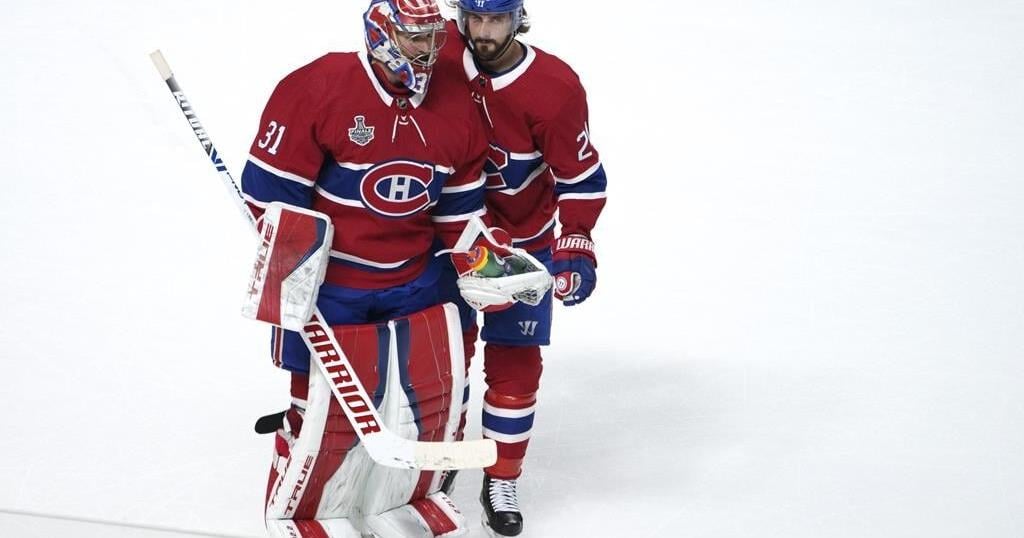Nick Suzuki and the Montreal Canadiens were dreaming big.
The club stunned the Toronto Maple Leafs in the first round of the 2021 playoffs before sweeping the Winnipeg Jets and besting the Vegas Golden Knights.
The second of two pandemic-truncated seasons — this one with unique divisions — would see Montreal face the Tampa Bay Lightning in the Stanley Cup final.
Suzuki, then a second-year centre, soon felt like his team was battling with one hand tied behind its back.
The NHL’s long-term injured reserve rules meant the Lightning were roughly US$18 million over the league’s $81.5-million salary cap — which doesn’t apply in the post-season — once the playoffs started.
“We didn’t really get helped out with that,” Suzuki recalled.
And everything, to be clear, was above board.
Tampa forward Nikita Kucherov missed the entire 56-game schedule following hip surgery, but was ready for Game 1 of the playoffs. The Russian winger went on to finish first in scoring that spring and early summer, winning the Conn Smythe Trophy as post-season MVP and helping the Lightning secure their second straight Cup.
Kucherov’s $9.5-million salary, however, hadn’t counted a cent against the cap during the season. Along with other LTIR moves — a player must sit out at least 10 regular-season games and 24 days for clubs to get salary relief — that allowed Tampa to massage its roster in ways that likely wouldn’t have been possible otherwise.
The NHL monitors the system to ensure teams respect the process, but there have been questions about cap circumvention ever since the Lightning won in 2021 and Vegas benefitted from LTIR on the way to capturing the Cup in 2023.
The Lightning leaned into the narrative after their victory, with Kucherov sporting an “$18M Over The Cap” T-shirt during the team’s celebrations.
“Obviously a loophole in the system,” said Suzuki, now Montreal’s captain. “Teams are fine to take advantage of that. It’s definitely a touchy subject.
“If you’re using it, you like it. And if you’re not … ”
Vegas captain Mark Stone had back surgery in February 2023 and was on LTIR until Game 1 of the playoffs that spring. The accrued cap space helped the Golden Knights acquire forwards Ivan Barbashev and Teddy Blueger, and goaltender Jonathan Quick for their post-season push.
Stone was again on LTIR last season with a lacerated spleen, which along with star centre Jack Eichel also being sidelined for a long stretch, allowed management to acquire defenceman Noah Hanifin along with forwards Tomas Hertl and Anthony Mantha.
Stone was again ready for his team’s playoff opener, although Vegas fell to the Dallas Stars in seven games.
The Lightning and Golden Knights, who have both repeatedly defended their moves as firmly within the LTIR framework, are not the first teams to use the rules this way.
The Chicago Blackhawks put Patrick Kane on LTIR in February 2015, but he was back in time for the playoffs — along with some newly acquired teammates — before helping the franchise win its third Cup in six years.
Colorado Avalanche centre Nathan MacKinnon said that while the system might need an update, he doesn’t believe players would sit out when healthy purely for cap reasons.
“Guys want to play,” he said. “It would be hard from the trade deadline on just to sit out and wait. I’d like to think the integrity of teams and guys is in the right place.
“But it’s definitely unfortunate.”
NHL deputy commissioner Bill Daly said there’s a majority appetite across the league’s 32 general managers to potentially tweak the system, but the way cap space is accumulated and calculated in-season doesn’t make for a simple equation.
“The majority (of GMs) would like us to continue to consider making some kind of adjustment,” Daly said. “That’s what we’ll look at.”
Toronto Maple Leafs GM Brad Treliving said one possible solution thrown around is a playoff salary cap.
“There’s always great ideas,” he cautioned. “Then you forget about the unintended consequences. I’d like to get more information on how it would all work and how it would all look.”
Edmonton Oilers centre Leon Draisaitl said regardless of the rules, efforts will always be made to find workarounds.
“It’s forever going to be that way where people are going to try and get creative,” he said.
Seattle Kraken defenceman Brandon Montour said simple fairness is key.
“If you’re sitting out an eight-, nine-, ten-million-dollar player, you shouldn’t have that much cap space,” he said. “You should have, like, half of it. You shouldn’t be able to use the eight, nine million bucks and be able to pick up three players.”
Suzuki, who has lived through a series where the ice felt tilted, hopes there’s eventually LTIR tinkering.
“It’s definitely given teams a huge advantage,” he said. “Sometimes you luck into it and other times it seems like it might be a strategy. I’m not in the medical room. I don’t really know what’s going on with those teams.
“It could be all fair.”
But he has his doubts.
This report by The Canadian Press was first published Oct. 9, 2024.
___
Follow @JClipperton_CP on X.
